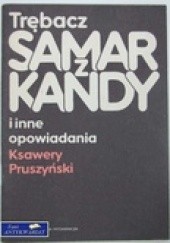 Trębacz z Samarkandy i inne opowadania, by Ksawery Pruszyński. 1983. Młodzieżowa Agencja Wydawnicza, Warszawa
Trębacz z Samarkandy i inne opowadania, by Ksawery Pruszyński. 1983. Młodzieżowa Agencja Wydawnicza, Warszawa
An Uzbek Story Very Similar to the Poles’ Hejnal
When the Poles were freed from Soviet captivity in 1942, they gathered in Yangi Yul. They had exchanges with the Uzbek natives. And then…
Ksawery Pruszynski writes:
“It is certain that no one here had heard of Krakow, the bugle call, or our Lajkonik. But they had a legend that is like half of our legend.” (p. 12). “It turns out that there is a certain legend in Samarkand. Or rather, a prophecy. Once upon a time, they took part in raids on Poland together with the Tatars. It is understandable that they did so, because where else would such masses have come from to invade our countries at the time of the raids?” (p. 11).
THE UZBEK VERSION OF THE HEJNAL COMBINES MILITARY AND RELIGIOUS ISSUES
“It was from one of the minarets of this city, as they say, that the call to prayer was sounded. The Tatars crept up to the very walls. They wanted to take the city by surprise… And as soon as the trumpeter was able to alert the city, an arrow from a Tatar bow pierced his throat. He died, but the alerted city defended itself. The Tatars were defeated.” (p. 11)
GOD’S CURSE WILL NOT BE LIFTED UNTIL THE POLES PLAY AN UNINTERRUPTED HEJNAL RIGHT IN THE TATAR CAPITAL
“They soon said that the defeat was caused by divine punishment for the fact that, while the city was preparing for prayers, its prayers were suddenly interrupted. I do not know why they decided this. Perhaps it was because all priests have a sense of solidarity, or perhaps it was because, finding no other reasons, they wanted to express what we call vis maior.” (p. 12)
“However, the sun of prosperity will shine for you too. But this will not happen until the trumpeter from Lechistan plays the song he did not finish in the market square in Samarkand. So says the Samarkand legend. And so believe all the Mongol tribes from Tian Shan to the shores of the Caspian Sea.” (p. 12)
LIFTING THE CURSE: IT WAS THE UZBEKS WHO ASKED THE POLES…
“After the break, the Uzbeks said: ‘We have one big request for you… If you are from Lechistan and you are soldiers… and you believe in your God… and you have trumpeters… could you not ask your trumpeters to play in our market square tomorrow evening? Opposite the mosque where the ashes of the great Timur lie?” (p. 9)
“In the evening, in front of the mosque in Samarkand, the famous mosque where the ashes of Tamerlane rest… they finally played the bugle call. Our St. Mary’s bugle call.” (p. 10)
CONCLUSION
“In the blue twilight of night, beneath a white, blue-tinged wall, Krakow suddenly slipped into the image of Samarkand. St. Mary’s Tower, the Market Square, Gołębia Street, Planty Park. The veil of space and time fell. Miles and centuries diminished somewhere. Between distant Krakow and the almost legendary Samarkand, a patterned drawing of a shared legend began to emerge, the same for me and for us.” (p. 12)
TYTUŁ: HEJNAŁ MARIACKI WSPIERANY PRZEZ ŹRÓDŁA UZBEKSKIE
Trębacz z Samarkandy i inne opowadania, by Ksawery Pruszyński. 1983. Młodzieżowa Agencja Wydawnicza, Warszawa
Opowieść Uzbecka Bardzo Podobna do Hejnalu
Kiedy Polacy zostali uwolnieni z niewoli radzieckiej w 1942 roku, zgromadzili się w Yangi Yul. Mieli rozmowy z Uzbekami. A potem…
Ksawery Pruszynski pisze:
“To pewna, że tutaj nikt nie słyszał o Krakowie, o hejnale, o naszym lajkoniku. Ale mieli legendę, która jest jakby połową naszej legendy.” (p. 12). “Jest, okazuje się, w Samarkandzie pewna legenda. A raczej proroctwo. Otóż oni kiedyś brali udział wespół z Tataram i w najazdach na Polskę. Rzecz zrozumiała, że brali, bo skądże by takie masy parły na nasze kraje w czas najazdów?” (p. 11).
WERSJA UZBECKA ŁĄCZY KWESTIE MILITARNE Z RELIGIJNYMI
“Właśnie z jednego z minaretów — jak oni mówią — tego miasta trąbiono modlitwę. Tatarzy podkradali się pod same mury. Chcieli miasto wziąć przez zaskoczenie…I zaledwie trębacz mógł zaalarmować miasto, gdy strzała z tatarskiego łuku przeszyła mu gardło. Zginął, ale zaalarmowane miasto obroniło się. Tatarzy ponieśli klęskę.” (p. 11)
KŁĄTWA BOŻA NIE ZOSTANIE ZNIESIONA, DOPÓKI POLACY NIE ZAGRAJĄ NIE-PRZERWANEGO HEJNALA W SAMEJ STOLICY TATARÓW
“O rzekli oni niebawem, że klęska była spowodowana karą nieba za to, że w czasie gdy miasto zabierało się do modlitw y przerwano znienacka jego pacierze. Nie wiem, dlaczego tak właśnie orzekli. Może dlatego, że wszyscy kapłani mają poczucie solidarności, może dlatego, że nie znalazłszy innych przyczyn chcieli w ten sposób wyrazić to, co my nazywamy vis maior.” (p. 12)
“‘Jednak i dla was zabłyśnie słońce pomyślności. Ale nie nastąpi to, zanim trębacz z Lechistanu nie zatrąbi na rynku w Samarkandzie pieśni, której w tedy nie skończył’. Tak powiada legenda samarkandzka. I tak wierzą wszystkie plemiona mongolskie od Tiań Szaniu po brzegi Morza Kaspijskiego.” (p. 12)
TO UZBECY PROSILI POLAKÓW…
“Po przerwie Uzbekowie rzekli: „Bo my mamy tu do was jedną wielką prośbę… Jeśli jesteście z Lechistanu i jesteście żołnierzami… i wierzycie w swego Boga… i macie trębaczy… czy nie moglibyście jutro wieczór kazać waszym trębaczom, by zatrąbili na naszym rynku? Na wprost meczetu, w którym leżą prochy wielkiego Timura?” (p. 9)
“Wieczorem przed meczetem w Samarkandzie, słynnym meczetem, gdzie spoczywają prochy Tamerlana,.. zagrali wreszcie hejnał. Nasz mariacki.” (p. 10)
WNIOSEK
“W zmierzchu niebieskim nocy, pod białą, wybłękitniałą ścianą, Kraków nagle zesuwał się na obraz Samarkandy. Wieża Mariacka, Rynek, Gołębia, Planty. Opadała zasłona przestrzeni i czasu. Zmalały gdzieś mile i wieki. Pomiędzy dalekim Krakowem i niemal legendarną Samarkandą poczynał się wić wzorzysty, jednakowy dla mich i dla nas rysunek wspólnej legendy.” (p. 12)

